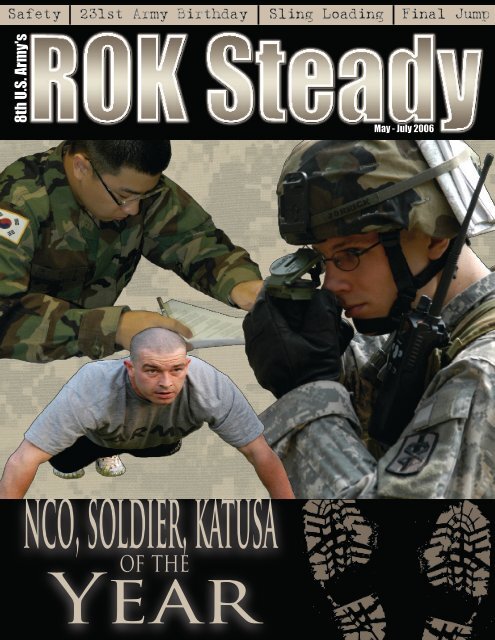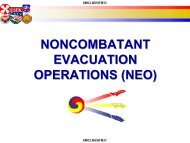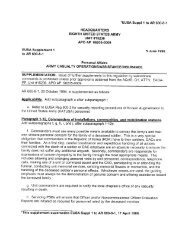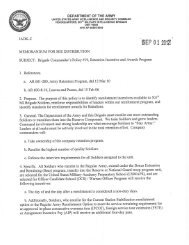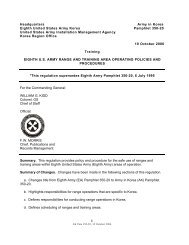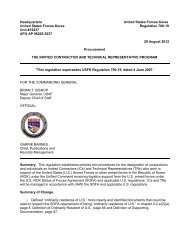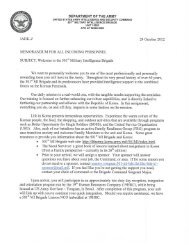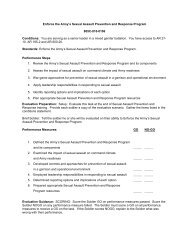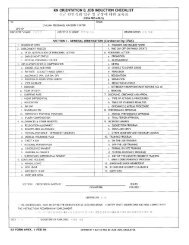Create successful ePaper yourself
Turn your PDF publications into a flip-book with our unique Google optimized e-Paper software.
Safety 231st <strong>Army</strong> Birthday Sling Loading Final Jump<br />
8th U.S. <strong>Army</strong>'s<br />
nco, soldier, katusa<br />
of the<br />
Year<br />
May - July 2006
Contents<br />
<strong>ROK</strong> <strong>Steady</strong><br />
Soldiers of the year<br />
Sling Loader Course<br />
Celebrating 231 Years<br />
Culinary 19th ESC competition<br />
transforms<br />
6<br />
14<br />
20<br />
36<br />
4<br />
5<br />
10<br />
18<br />
22<br />
24<br />
26<br />
28<br />
30<br />
34<br />
38<br />
Lt. Gen. Valcourt<br />
Command Sgt. Maj. Wheeler<br />
Buggin' out<br />
<strong>Army</strong> Lt. Col. has mosquito<br />
named after him<br />
8th U.S. <strong>Army</strong> Competition<br />
19th ESC sponsors<br />
annual event<br />
Safety in Korea<br />
Staying safe on the<br />
Korean Peninsula<br />
Summer safety<br />
Be aware of summer<br />
season's hazards<br />
Beating the heat<br />
Avoiding heat<br />
injuries this summer<br />
Monsoon safety<br />
Heavy rains can create<br />
dangerous situations<br />
Preventing STDs<br />
Abstinence, condoms, thinking<br />
can help stop the spread<br />
Biker Beware<br />
Tips for motorcycle riders<br />
on and off the road<br />
One for the road<br />
A Special Operations<br />
General makes a final jump<br />
May-July 2006<br />
Vol. 4, No. 3<br />
8th U.S. <strong>Army</strong> Commander<br />
Lt. Gen. David P. Valcourt<br />
8th U.S. <strong>Army</strong> Public Affairs Officer<br />
Maj. Tanya J. Bradsher<br />
8th U.S. <strong>Army</strong> Public Affairs SGM<br />
Master Sgt. Sue Harper<br />
Public Information Officer<br />
Maj. Jerome Pionk<br />
Command Information Chief<br />
Capt. Stacy A. Ouellette<br />
<strong>ROK</strong> <strong>Steady</strong> Staff<br />
Editor/Layout & Design<br />
Sgt. Christopher Fincham<br />
Assistant Editor<br />
Cpl. Sadie Bleistein<br />
Staff Writers<br />
Pfc. Daniel Love<br />
Pfc. Fay Jakymec<br />
Pvt. Brandon Moreno<br />
Send submissions, letters and suggestions<br />
to: 8th <strong>Army</strong> PAO, ATTN: <strong>ROK</strong><br />
<strong>Steady</strong>, PSC 303 Box 42, APO AP<br />
96204-0010, or call 723-4827. Fax us<br />
at 723-3537 or e-mail information to:<br />
<strong>ROK</strong>STEADY@korea.army.mil<br />
Deadline: 45 days prior to date of<br />
publication<br />
<strong>ROK</strong> <strong>Steady</strong> is an authorized command<br />
information publication, published<br />
monthly for the members of 8th U.S.<br />
<strong>Army</strong> and their dependents. Distribution<br />
is 9,500 copies Peninsula-wide.<br />
Contents of <strong>ROK</strong> <strong>Steady</strong> are not necessarily<br />
the official views of, or endorsed<br />
by, the U.S. Government, Department of<br />
Defense, USFK or 8th U.S. <strong>Army</strong>.<br />
<strong>ROK</strong> <strong>Steady</strong> is an unofficial publication<br />
authorized under AR 360-1. Editorial<br />
content is prepared, edited, and<br />
provided by the Command Information<br />
Division of the 8th U.S. <strong>Army</strong> Public<br />
Affairs Office.<br />
Keepin' clean in the field<br />
32<br />
2 <strong>ROK</strong> <strong>Steady</strong><br />
<strong>ROK</strong> <strong>Steady</strong> 3
Lt. Gen. David P. Valcourt<br />
Take time, do it right<br />
By Lt. Gen. David P. Valcourt<br />
Commander, 8th U.S. <strong>Army</strong><br />
When I stop and think about safety this month, I get<br />
chills running down my spine. If you stop and think about<br />
it, you will quickly realize that this month is the convergence<br />
of a “Perfect Storm” in a sense.<br />
Mother Nature will continue to be dealing us her best<br />
dish of Monsoon weather, and, this year so far, the rains<br />
have been tough, and we have had some unprecedented<br />
lightning and thunder storms. The Han River hit a 30-year<br />
high this summer already!<br />
Combine Mother Nature with one of our two annual<br />
peaks in training -- when many of you will be practicing<br />
your field craft skills while living outside, working with<br />
antennas, power generation equipment, doing lots of<br />
driving of both tactical and non-tactical military vehicles,<br />
working longer hours, wearing battle rattle, and reacting<br />
to simulated chemical attacks -- If you add that all up we<br />
have conditions for increased risk of injuries or accidents if<br />
we are not vigilant. And if combining the weather and our<br />
period of greatest training density was not already difficult<br />
enough, let’s change out our key and essential leaders across<br />
all of our formations and bring in new team members,<br />
many of them have never been on the Peninsula before!<br />
Now you can understand why I said that I get chills<br />
when I think about safety in the upcoming month. In<br />
Korea, if you are driving, you have to go slow to go fast.<br />
Think about that. How often have you seen someone driving<br />
fast to find themselves in an unexpected situation, and<br />
the next thing you know there is a military police vehicle<br />
or KNP alongside him or her recording the details of the<br />
accident.<br />
While the Soldier that went slow passes the accident<br />
scene and is already cleaned up and back in the barracks<br />
before the accident scene is cleaned up, and the fast driver<br />
finally gets home hours later. In Korea, you have to go slow<br />
to go fast! Each one of you have been given an ability to<br />
make common sense judgments, and your military training<br />
has helped you anticipate what others might not expect.<br />
I would ask each of you to make a daily habit of asking<br />
yourself “What is the worst thing that could happen as I get<br />
ready to, (fill in the blank), and that inner common sense<br />
voice will speak to you. Listen to that voice and take the<br />
appropriate steps to not let that “worst thing” happen. In<br />
<strong>Army</strong> ‘speak,’ that is composite risk management or CRM,<br />
and good leaders will continuously be running this thought<br />
process as they lead their Soldiers through training. I have<br />
talked a lot about safety so far, and, by and large, we are<br />
doing a pretty good job of safety in 8th <strong>Army</strong> this summer,<br />
but we can’t rest for a minute or become complacent.<br />
There is one more subject that I would like to bring<br />
up for command emphasis, and it bothers both Command<br />
Sgt. Maj. Wheeler and me a great deal. We have too many<br />
incidences of sexual assault going on in our formations.<br />
Command sergeant major and I are putting the heat on<br />
the chain of command to deal with this quickly. There is<br />
never an excuse for one of our Soldiers to take advantage of<br />
another or to force another Soldier to do something against<br />
his or her will. It is as simple as this in my mind -- we talk<br />
about <strong>Army</strong> Values -- and one of them is respect.<br />
A Soldier who would take sexual advantage of another<br />
is clearly one that does not have respect for a fellow Soldier.<br />
That Soldier is not living our <strong>Army</strong> Values, and you can’t<br />
help but think if that Soldier does not live up to respecting<br />
others, what else won’t that Soldier live up to?<br />
When the chips are down, I’ll bet that is the same<br />
Soldier that will cut, run, or quit, that will leave a fallen<br />
comrade, and most likely places himself first and not our<br />
mission. Personally, I would rather not have that Soldier<br />
in the 8th <strong>Army</strong> formation, neither does the CSM, and I<br />
don’t think that you do either. So, I ask for your help to<br />
police this up. The Buddy system works, and watch the<br />
alcohol. Most of these sexual assaults start innocently with<br />
Soldiers trying to have a good time, but the alcohol takes<br />
away our good judgement. Be careful. Keep our barracks<br />
safe for everyone to live in.<br />
Let’s get our game faces on for a great training month<br />
-- ruck up, think safety in every mission activity and do<br />
not let Murphy find a way into your formation -- and<br />
lastly, but most of all let’s respect each other and eliminate<br />
value-less behavior. It is an honor to be your commander.<br />
Pacific Victors!<br />
Command Sgt. Maj. Barry Wheeler<br />
Safety:<br />
I-owe-you-owe-me issue<br />
By Command Sgt. Maj.<br />
Barry Wheeler<br />
Command Sergeant Major,<br />
UNC/CFC/USFK/8th U.S. <strong>Army</strong><br />
As we progress in our summer safety campaign,<br />
I remind all our servicemembers, civilians, family<br />
members and contractors while safety is critical at all<br />
times, it’s even more so as we enter the monsoon and<br />
summer seasons.<br />
If you’ve recently arrived in the Republic of Korea<br />
and this is your first tour here, you may not know<br />
much about the dangers of monsoons. In a nutshell,<br />
we’re in the middle of a season in which heavy rain<br />
accounts for more than 50 percent of Korea’s annual<br />
rainfall. In 1998, U.S. Soldiers and more that 300 Korean<br />
civilians were killed during monsoon season. Pay<br />
attention to posted wet weather guidance. I’ll include<br />
a few Risk Management Points from our command<br />
safety office:<br />
(1) Troops in a field environment will be at<br />
great risk during this high-risk period.<br />
(2) Heavy rains can occur outside the monsoon<br />
season.<br />
(3) Weather may be different than forecasted.<br />
(4) Flooding can occur anywhere and in<br />
different areas.<br />
(5) Weather should be a risk assessment factor<br />
12 months a year.<br />
(6) Walk terrain; develop/brief egress<br />
plans.<br />
(7) Identify weak swimmers and non-swimmers.<br />
(8) Make risk decision timely or elevate.<br />
(9) Restrict vehicle travel. Do not drive<br />
through a flooded area. If you come upon a<br />
flooded road, turn around. More people drown<br />
in their cars than anywhere else.<br />
Another weather hazard that increases risks for<br />
everyone during the <strong>ROK</strong> summer is heat. Military<br />
operations must continue, regardless of weather conditions.<br />
The key to continuing operations as well as to<br />
safely enjoying summer activities such as swimming,<br />
softball and cookouts, is the use of the risk manage-<br />
ment process to identify risks associated with a particular<br />
activity.<br />
Safety is an I-owe-you-owe-me issue.<br />
Your leaders owe you guidance and information to<br />
safely navigate your environment, whether in work or<br />
recreation. As Soldiers, you owe your leaders adherence<br />
to that guidance and the established rules of safety<br />
that are essential to our <strong>Army</strong> mission to be ready to<br />
fight tonight and win. Some of those non-negotiable<br />
rules, which can never be overemphasized, include<br />
don’t drink and drive, always use the buddy system<br />
and observe curfew hours. These rules are in place<br />
to protect us. Injuries take Soldiers away from their<br />
mission and they are not easily replaced.<br />
That fact should remind Soldiers of how important<br />
they are individually. Not only are you the <strong>Army</strong>’s<br />
best credential; you are our best asset. Treat yourself<br />
and others that way and watch how naturally safety<br />
follows.<br />
4 <strong>ROK</strong> <strong>Steady</strong><br />
<strong>ROK</strong> <strong>Steady</strong> 5
2006<br />
8th U.S. <strong>Army</strong>'s NCO, Soldier, KATUSA of the Year<br />
NCO,<br />
he<br />
KATUSA<br />
ofthe Year<br />
After<br />
of the<br />
6<br />
<strong>ROK</strong> <strong>Steady</strong><br />
NCO,KATUSA<br />
Soldier<br />
Story by Sgt. Christopher Fincham, 8th U.S. <strong>Army</strong> PAO<br />
Photos by Pfc. Oh, Kyo Dae, 19th ESC PAO<br />
numerous battalion-, brigade- and division-level<br />
boards and competitions, some of the 8th U.S. <strong>Army</strong>'s<br />
top troops gathered at Camp Carroll in early June to<br />
vie for the title of "best on the Peninsula."<br />
...continued on page 8<br />
<strong>ROK</strong> <strong>Steady</strong><br />
7
NCO of the Year<br />
gt. Dustin Jorrick<br />
91W, 18th Medical Command<br />
Over the course of four days, nine of 8th<br />
U.S. <strong>Army</strong>'s finest Soldiers performed<br />
everything from written exams and<br />
physical fitness tests to plotting courses<br />
through mountains and performing first<br />
aid on mock casualties. All for the right to call themselves<br />
the best noncommissioned officer, Soldier and Korean Augmentee<br />
to the U.S. <strong>Army</strong> of the year in 8th U.S. <strong>Army</strong>.<br />
Sgt. Dustin Jorrick, of the 52nd Medical Logistics<br />
Battalion was named the NCO of the Year, Spc. Corey<br />
Luffler, of 1/15th Field Artillery Regiment, the Soldier<br />
of the Year and Cpl. Eun Soo, Park, from the 20th Area<br />
Support Group, the KATUSA of the Year.<br />
While Luffler pointed out that just trying to prepare<br />
for all the various events of the competition was a difficult<br />
task in itself, all of the winners agreed the hardest part was<br />
completing the land navigation course.<br />
“The most difficult event was the land navigation,<br />
Park said.”<br />
"The land navigation [area] was filled with thorn bushes<br />
that were head-level high," explained Jorrick. "By the time<br />
I finished, my ACU's were unserviceable."<br />
All of the competitors performed at their highest levels<br />
and after days of struggling, not one of the would-be victors<br />
thought that they had won.<br />
"After the competition, I was proud of the way I had<br />
performed," said Luffler. "I knew it was going to be close,<br />
and I honestly thought one of the other competitors had<br />
edged me out."<br />
"After all the events were finished, I knew it was really<br />
close between the NCOs," Jorrick said. "All of us gave it<br />
our best, but because they kept all of the scores from us,<br />
I had absolutely no clue as to where I stood. I could only<br />
do my best and hope for the best."<br />
The Soldiers had to wait more than a week to finally<br />
hear the final tally when their names were announced at<br />
the <strong>Army</strong> Ball.<br />
"I couldn’t feel any difference until I got invited to the<br />
<strong>Army</strong> Birthday Ball," Park said. "I feel more responsibilities<br />
but I think it’s excellent."<br />
"I feel like I have more credibility with the Soldiers.<br />
Many of them come up to me and ask me questions and<br />
it's nice knowing that I have the answer (at least most of the<br />
time). I hope that being the USFK NCO of the Year sets a<br />
good example for them to follow as well," Jorrick said.<br />
Up next for Jorrick and Luffler is the Department of<br />
the <strong>Army</strong> Soldier of the Year competition in Washington<br />
D.C. at the end of September.<br />
(Editor's note: According to AR 700-84 Paragraph 5-12, Soldiers<br />
cannot be reissued clothing damaged in training events such as an FTX.<br />
The regulation advises Soldiers to wear "code X," or unserviceable items,<br />
during such events.)<br />
KATUSA of the Year<br />
Cpl. Park, Eun-Soo<br />
92A, 20th Area Support Group<br />
Soldier of the Year<br />
Spc. Corey Luffler<br />
For more on this year's competition see page 18<br />
8 <strong>ROK</strong> <strong>Steady</strong><br />
<strong>ROK</strong> <strong>Steady</strong><br />
96B, 2nd Infantry Division<br />
9
Colonel Terry Klein<br />
10<br />
uggin'<br />
By Sgt. Maj. Donald Thomas<br />
8th U.S. <strong>Army</strong> PAO<br />
Just how “bugged” out would you have to be to have a<br />
mosquito named after you?<br />
It’s not a bad claim to fame when your reputation is<br />
based on the good work you’ve done against life-threatening<br />
diseases like malaria.<br />
Col. Terry Klein, an entomologist at 18th Medical<br />
Command, Force Protection, recently received not only<br />
the honor of having a mosquito named after him (Anophe-<br />
<strong>ROK</strong> <strong>Steady</strong><br />
out<br />
rea Presidential Award for his “significant contribution” to<br />
les-kleini) but<br />
also the Republic<br />
of Ko-<br />
entomology.<br />
Malaria re-emerged in Korea in 1993 after being<br />
eradicated in the 1970s. Eighteen cases have been reported<br />
this year; nine diagnosed on peninsula and nine after the<br />
persons left Korea.<br />
Col. Terry Klein inspects an Area I training site for Korean Hemorrhagic Fever using rodent traps. Courtesy photo.<br />
Since 1999, Klein has helped lead the nation’s fight<br />
against malaria as well as rodent and tick borne diseases,<br />
Japanese encephalitis and scrub typhus.<br />
Specifically, Klein helped discover multiple species of<br />
mosquitoes where experts thought only one existed. He<br />
then clarified which of those species carry malaria and<br />
pinpointed where they are concentrated. The discovery<br />
impacts where and how U.S. and Republic of Korea forces<br />
train on the peninsula.<br />
“The primary objective is to know as much about Ko-<br />
rea and the problems it has prior to going into hostilities.<br />
‘Cause once hostilities start, you’re not going to do any of<br />
this. And if you know the information before hand then<br />
you can consult with the commander and give him the<br />
risks,” said Klein.<br />
Lt. Col. Lee, Hee-Choon, a preventive medicine doctor<br />
at 18th MEDCOM, who worked for Klein’s until recently,<br />
talked about Klein’s impact.<br />
“He found a reason why malaria is concentrated<br />
...continued on page 12<br />
<strong>ROK</strong> <strong>Steady</strong><br />
11
primarily in the DMZ area and not<br />
spreading further down south or<br />
further up north. That’s because of<br />
habitat. The mosquito that is a good<br />
vector (carrier) for malaria in Korea<br />
just stays around the DMZ area. Sinensis,<br />
as a group is all over South Korea.<br />
But if he (Klein) had not been able<br />
to determine that a specific species is<br />
more likely to transmit malaria, then<br />
we wouldn’t understand why it’s not<br />
spreading throughout Korea,” said Lee,<br />
who worked with Klein for his entire<br />
seven-year tour in Korea.<br />
Klein credits the extended tour<br />
for his impact. “If I were here<br />
for just two years, probably not<br />
much of this could have been<br />
done,” he said.<br />
When Klein talks about<br />
getting the presidential award,<br />
presented at Korea’s 34th Celebration<br />
of World Health Day<br />
in early April, he is appreciative<br />
and reserved. He is more<br />
animated however,<br />
when conv<br />
e r s a -<br />
tion<br />
t u r n s<br />
to Anopholes kleini. The 59-year-old<br />
Klein smiles shyly, admitting he was<br />
a “bit embarrassed” when he learned<br />
about the unusual honor. But he knows<br />
the award is the result of 21 years of<br />
world renowned research.<br />
Those years took Klein and his malaria<br />
r e -<br />
search to far flung places like the<br />
jungles of Brazil, Thailand and Peru.<br />
Here in Korea he has collaborated<br />
on projects and discoveries with highly<br />
respected research institutes like the<br />
Korean National Institute of Health<br />
(KNIH), Korean Center for Disease<br />
Control (KCDC), Jeon-buk University,<br />
Seoul National University, and<br />
Korea University. Klein sweetens these<br />
partnerships by sharing the mosquitoes,<br />
rats, and ticks he traps.<br />
It was probably a counterpart at<br />
KNIH that nominated Klein for the<br />
presidential award, said Klein. The<br />
nominating person in the mosquito<br />
naming was a mystery until the honor<br />
was published in a medical journal.<br />
“In Brazil we were working with<br />
a new (mosquito) species but we<br />
didn’t name them because there<br />
was a Brazilian researcher also<br />
working with them and we chose<br />
not to scoop her in identifying<br />
them.<br />
“When I came to Korea I found<br />
out there were differences in the mosquito<br />
species here. When we sent them<br />
off, they (a team of doctors at Korea<br />
University) identified two genetically<br />
distinct species. And so in the process<br />
with all the malaria work I’d done,<br />
someone chose to name it after me,”<br />
said Klein.<br />
That someone, Dr. Leopold “Pollie”<br />
Rueda, Walter Reed <strong>Army</strong> Institute<br />
of Research, was revealed<br />
when the animal taxonomist journal,<br />
Zootaxa, published the discovery. A<br />
Zootaxa’s 2005 issue records that<br />
Anopheles kleini is<br />
named after Klein for his “numerous<br />
contributions to mosquito<br />
research in Asia.” Rueda and<br />
Klein had worked together<br />
during Reuda’s temporary<br />
duty trip to Korea in<br />
2002.<br />
“I was happy but a little bit embarrassed<br />
because a lot of people have<br />
done work on mosquitoes and a lot of<br />
people have put major effort into this,”<br />
said Klein, quick to share credit with<br />
other entomologists, research institutes<br />
in the United States and Korea, and<br />
with preventive medical doctors like<br />
Lee, who described the bigness of<br />
Klein’s accomplishments.<br />
“In academic fields, having a mosquito<br />
named after you is like having<br />
an airport named after you,” said Lee.<br />
He called the naming of the Anopheles<br />
kleini, the “crown jewel” of Klein’s<br />
career as an entomologist.<br />
Klein’s background doesn’t include<br />
the stereotypical image of an<br />
entomologist. He wasn’t one of those<br />
kids who plays with bugs then grows<br />
up to make a living at it. He was living<br />
life as a junior high school teacher<br />
near his small home town of Turner,<br />
Oregon, when his interest in entomology<br />
peaked.<br />
“I was teaching biology and I<br />
started collecting butterflies. And I<br />
got a grant to go work on taxonomy<br />
of leaf hoppers,” said Klein. He quit<br />
teaching junior high to pursue his<br />
grant at Oregon State. His desire for<br />
more on-the-job type training led to<br />
the <strong>Army</strong>.<br />
“A professor said, ‘Join the <strong>Army</strong>;<br />
they’ll train you.’ My family isn’t<br />
military so my first impression was,<br />
‘I’ll join the <strong>Army</strong> for three years; I’ll<br />
train, I’ll get out and get a real job,’”<br />
said Klein.<br />
His decision to stay in the <strong>Army</strong><br />
has had life saving benefits for Soldiers.<br />
“The Soldier says he doesn’t want<br />
something 10 years from now. He wants<br />
something today. If we can find something<br />
today for him, that’s much better<br />
than saying we’re working on it.<br />
“They’ve been working on a malaria<br />
vaccine since I’ve been in the <strong>Army</strong> and<br />
they don’t have one,” said Klein. He said<br />
Soldiers can take immediate preventive<br />
action when experts identify species,<br />
point out risk areas and expose control<br />
techniques that don’t work.<br />
“For example, we know Warrior<br />
Base is the hottest area for infection<br />
right now and to a lesser extent Camp<br />
Casey and Rodriquez Range. We’ve<br />
identified there are mosquitoes in the<br />
Warrior Base area infected<br />
with Japanese encephalitis,<br />
which has between 10 and<br />
30 percent mortality if<br />
you show symptoms,” said<br />
Klein.<br />
The face of the soonto-be-retired<br />
vet becomes<br />
that of the school teacher<br />
again when he talks about<br />
the differences in mosquitoes<br />
which “like people,” as<br />
in love to bit humans, and<br />
mosquitoes who “don’t like<br />
people,” and feed on humans only when<br />
there’s nothing better on the menu.<br />
He stays in the lecture mode, using<br />
phonetically impressive terms to point<br />
out the difference in Korea’s rodent<br />
species.<br />
For the scientifically challenged, he<br />
explains there is an “urban rat” and a<br />
“field mouse,” one more deadly than the<br />
other and both of which soldiers should<br />
stay away from. Rodent feces and urine<br />
cause Korean hemorrhagic fever (KHF)<br />
or hanta virus, a tricky virus that takes<br />
30 days or more to show symptoms.<br />
“We had one case a couple of years<br />
ago where the patient came in with<br />
symptoms including a headache. The<br />
doctor treated him for migraines. He<br />
came in the next day; they sent him<br />
back home with more medicine. The<br />
third time he came in they took his appendix<br />
out because he had back pain.<br />
Back pain is typical with KHF because<br />
it affects your kidneys. In the process,<br />
they found out he had creatine in the<br />
blood, so they did a test and found out<br />
he had hanta virus. But the patient survived<br />
and doesn’t have to worry about<br />
his appendix or getting hemorrhagic<br />
fever again,” said Klein.<br />
When four United States Forces<br />
Korea soldiers caught KHF in 2005, it<br />
was Klein’s survey of USFK training sites<br />
that helped pinpoint where the Soldiers<br />
contracted the disease. Labs found that<br />
blood from the rodents Klein trapped<br />
in the field had the same virus found in<br />
the Soldiers’ blood. The match proved<br />
all four Soldiers contracted the viruses<br />
near the DMZ.<br />
“I’ve been told I should get the gold<br />
metal in rat trapping,” said Klein, unable<br />
to hold back his laugh.<br />
Klein’s success in finding ample<br />
rodent samples when others can’t is an<br />
example of his detailed approach to his<br />
Anopheles kleini, adult female, habitus.<br />
work, according to Lee.<br />
“People who go out to trap rats with<br />
him might set traps upside down, in the<br />
wrong place or so high that the rat would<br />
have to pole vault to get inside,” said Lee.<br />
Lee called Klein a boss who “let people<br />
make their mistakes and never used<br />
his position to browbeat anybody.” He<br />
contrasted that with Klein the worker<br />
as “a bulldog.”<br />
“He took me out to the field, the<br />
rice patties near the DMZ, showed me<br />
the mosquito eggs, the rats. We picked<br />
up malaria vector mosquitoes inside<br />
telephone booths as soldiers were out<br />
there in their shorts making phone calls<br />
to their girlfriends and getting bitten.<br />
“We did a lot out there trying to<br />
figure out how these soldiers are getting<br />
malaria, what preventive measures<br />
they’re using or not using,” said Lee,<br />
who considers Klein more a mentor and<br />
friend than boss.<br />
The chance to mentor and form<br />
relationships that are like family is<br />
what Klein says he’ll miss most about<br />
the <strong>Army</strong>. He’ll retire this summer and<br />
settle in Korea with his wife, Kyung-<br />
Hee. He’ll end his military service, but<br />
not his service to mankind, given all the<br />
viral challenges still out there. He’s due<br />
to collaborate on a West Nile virus study<br />
in late spring.<br />
“We’re actually looking for viruses<br />
in ticks right now. We have lots of parasites<br />
in ticks we’ve never identified. We’ve<br />
got a spotted fever group which has been<br />
identified in Koreans but we don’t know<br />
to what extent. It’s like one in China, but<br />
it has never been named,” said Klein.<br />
A big obstacle is the lack of diagnostics,<br />
or systems that let doctors<br />
take blood from victims and identify<br />
exactly what they have, said Klein, who<br />
described a mysterious mosquito virus<br />
out there as “somewhere between<br />
12 <strong>ROK</strong> <strong>Steady</strong><br />
<strong>ROK</strong> <strong>Steady</strong><br />
13
Sling-Load Training<br />
Course<br />
certifies<br />
Sling Loaders<br />
Story and photos by Pfc. Amanda Merfeld , 2nd Infantry Division PAO<br />
The rotor-wash from helicopters blowing on Soldiers marked<br />
the beginning of the final test for the Sling Load Inspector’s Certi-<br />
fication Course. Soldiers from Area I participated in this week-long<br />
course that included various written, visual and physical tests.<br />
...continued on page 16<br />
14 <strong>ROK</strong> <strong>Steady</strong> <strong>ROK</strong> <strong>Steady</strong> 15
SLICC trains specialists and above in basic sling load<br />
operations, like using hand signals to communicate<br />
with aircraft personnel and aircraft recognition and<br />
limitations. They are trained to confidently maneuver<br />
cargo hook-reach pendants, basic hardware and<br />
expendables, cargo carrying devices and safety equipment. The<br />
students were taught hook-up team and signalman duties and<br />
responsibilities and the proper rigging and inspection of loads.<br />
“I think this training should be mandatory throughout<br />
the <strong>Army</strong> for all personnel dealing with aircraft,” said Staff Sgt.<br />
Frank Howard, Bravo Troop, 4th Squadron, 7th Cavalry Regi-<br />
16 <strong>ROK</strong> <strong>Steady</strong><br />
ment. Howard was one of 46 Soldiers to successfully complete<br />
SLICC.<br />
Mobile Training Team instructors for the certification course<br />
came from Fort Lee, Va. to teach Soldiers here and other locations<br />
how to be successful leaders during any sling-load operation.<br />
“We train Soldiers in Germany, Singapore, Alaska and<br />
other places not in [the U.S.],” said Staff Sgt. Jason Brown 2nd<br />
Battalion, 62nd Quartermaster Company, Aerial Delivery and<br />
Field Services Department<br />
The course is conducted as a local course at Fort Lee, and as<br />
a mobile training course at other host installations.<br />
Clockwise from left: Soldiers prepare to hook up the<br />
HMMWV to the incoming helicopter. A Soldier inspects<br />
his load for transportation. An instructor oversees<br />
Soldiers during the hands-on part of the course. Soldiers<br />
quickly run away from the aircraft during the first slingload<br />
exercise.<br />
<strong>ROK</strong> <strong>Steady</strong><br />
17
19th Sustainment Command (Expeditionary)<br />
Sgt. Um, Hee Woong completes that claymore mine portion of the warrior tasks testing.<br />
Soldiers compete<br />
for annual title<br />
Story and photos by<br />
Pfc. Oh, Kyo Dae<br />
19th ESC PAO<br />
There was one more reason to<br />
celebrate at the 231st <strong>Army</strong> Birthday<br />
Ball in Seoul when Command Sgt.<br />
Major Barry Wheeler announced<br />
the final results of the <strong>Eighth</strong> United<br />
States <strong>Army</strong> Noncommissioned Officer,<br />
Soldier and Korean Augmentee<br />
to the United States <strong>Army</strong> of the Year<br />
Competition.<br />
Sgt. Dustin Jorrick, of the 52nd<br />
Medical Logistics Battalion was named<br />
the NCO of the Year, Spc. Corey<br />
Luffler, of 1/15th Field Artillery Regiment,<br />
the Soldier of the Year and Cpl.<br />
Eun Soo, Park, from the 20th Area<br />
Support Group, the KATUSA of the<br />
Year. A total of nine Soldiers from 8th<br />
<strong>Army</strong> units throughout the Korean<br />
peninsula took part in the competition,<br />
which was held at Camp Carroll<br />
June 5-8 and was hosted by the 19th<br />
ESC.<br />
“The 8th <strong>Army</strong> Soldier of the Year<br />
Competition is designed to identify<br />
the most outstanding NCO, Soldier<br />
and KATUSA to represent 8th <strong>Army</strong><br />
at Department of the <strong>Army</strong> Competition<br />
later this year,” said Master Sgt.<br />
Stephen Stoltz, 19th Sustainment<br />
Command Expeditionary, who helped<br />
to coordinate the competition.<br />
8th <strong>Army</strong> conducted three division-level<br />
boards prior to this competition,<br />
added Stoltz.<br />
The Soldiers, KATUSAs and<br />
NCOs who made it to the final competition<br />
faced a challenging series of<br />
tests and military tasks.<br />
The candidates completed a 25question<br />
test on general military<br />
topics, wrote an essay, took the <strong>Army</strong><br />
Physical Fitness Test, qualified with<br />
the M16 and completed 15 Warrior<br />
Tasks and Drills throughout the first<br />
three days of the competition, said<br />
Stoltz.<br />
Spc. Dil Uhlin, 348th Quartermaster<br />
Company, said the land navigation<br />
portion was difficult.<br />
“My company does land navigation<br />
in Yong-in Mountain, which is<br />
pretty tough, and I didn’t think it<br />
could get worse than that,” he said.<br />
“But this area (Camp Carroll) is so<br />
thick, and there are no flat circles. The<br />
vegetation is so tall that it’s really hard<br />
to make your way down the hills to the<br />
point without taking a detour.”<br />
Pfc. Kent Wiley, 18th Medical<br />
Command, said he was confident about<br />
his performance during the competition.<br />
“I have done really well, because I<br />
had really good instructions from drill<br />
sergeants and other sergeants in my past<br />
about these Warrior Tasks and Drills. I<br />
went through them a lot,” said Wiley.<br />
On the third evening, the candidates<br />
faced a mystery event, which<br />
turned out to be Pugel Stick Combatives.<br />
The Soldiers had to fight an opponent<br />
with a pugel stick, which looks<br />
like a huge cotton swab.<br />
On the final day, the Soldiers<br />
appeared before a board, with Command<br />
Sgt. Maj. Wheeler serving as the<br />
A competitor struggles to pull on his over-boots while going to Mission Oriented Protective Posture 4.<br />
president, to answer a series of militaryrelated<br />
questions.<br />
Sgt. Um, Hee Woong, 18th MED-<br />
COM, said the hardest part of the<br />
competition was studying the board<br />
materials.<br />
“I have won about 11 boards so I<br />
thought I didn’t have much to study.<br />
But the materials of the board changed,<br />
and I had to study and prepare for new<br />
topics,” said Um.<br />
Sgt. Matthew Walker, 2nd Air Defense<br />
Artillery, said the board is not just<br />
about competing against his competitors,<br />
but competing against himself.<br />
“The competition is very physical<br />
and mental,” he said. “Once you get<br />
past the physical endurance part, than<br />
it becomes mental.<br />
“When I was on the land navigation<br />
course, of course there were times<br />
when I wanted to stop and quit,” Walker<br />
said. “But if I am in battle and the<br />
enemy is chasing me, I am not going<br />
to stop; I would have to keep going. I<br />
had to have that in mind.”<br />
Sgt. Mathew Walker squeezes out as many push ups as possible during the competition.<br />
18 <strong>ROK</strong> <strong>Steady</strong> <strong>ROK</strong> <strong>Steady</strong> 19
Clockwise from left: Command<br />
Sgt. Maj. Barry Wheeler attaches a<br />
campaign ribbon to the U.S. <strong>Army</strong><br />
flag. Lt. Gen. David Valcourt and<br />
Command Sgt. Maj. Wheeler are<br />
joined by 8th U.S. <strong>Army</strong>'s youngest<br />
enlisted Soldier and the youngest<br />
commissioned officer to cut the<br />
<strong>Army</strong> birthday cake. Soldiers dressed<br />
in uniforms from previous wars<br />
open the ceremonies of the <strong>Army</strong><br />
Ball. Sgt. 1st Class Jamie Buckley<br />
performs at the ball. Buckley came<br />
back to Korea from Fort Knox, Ky.<br />
to perform "We go Together," which<br />
he wrote. Lt. Gen Valcourt addresses<br />
the audience at the ball. Photos by<br />
Pfc. Fay Jakymec.<br />
Celebrating<br />
231<br />
years
safety<br />
Are YOU committed? Zero fatalities<br />
irst<br />
By Pfc. Daniel Love<br />
situational awareness is key.<br />
emergency.”<br />
8th U.S. <strong>Army</strong> PAO<br />
“Drivers also tend to only follow the<br />
car in front of them and not watch what<br />
The United States covers an<br />
area of over 3.5 million square<br />
American Soldiers serve around the is going on around them. If something miles, so Americans from different<br />
world in a variety of locations. Some comes from the sides or the car in front parts of the nation are accustomed<br />
are obviously more dangerous than stops too fast, they have a high chance of to different types of weather pat-<br />
others, but that doesn’t mean Soldiers getting in an accident.”<br />
terns. No matter where they are<br />
in those assumed “less dangerous Vehicles on the Korean streets are from, U.S. servicemembers who are<br />
places” can afford to get complacent not only dangerous when riding inside of stationed in South Korea must become<br />
when it comes to staying safe. them, but also when walking near them accustomed to the local weather.<br />
Korea has several factors that con- on sidewalks or roadsides. Many Korean “We do have the monsoon season<br />
tribute to safety and risk management roads were built before the advent of cars, and occasional typhoons,” said Joseph<br />
when it comes to conducting day-to-day so they leave little space for mistakes of Colson, an 8th U.S. <strong>Army</strong> tactical safety<br />
operations as well as exercises and free drivers or pedestrians.<br />
manager. “When a typhoon is inbound<br />
time. The most prevalent of these risks “People can be walking and then the weather folks provide us with suffi-<br />
are driving conditions, adverse weather unexpectedly jet into the roadway around cient notice to prepare. They do a pretty<br />
patterns and protests.<br />
the crosswalk,” said Theobald. “[these] good job of letting us know when we need<br />
One of the first things a lot of people pedestrians get struck by vehicles close to get the word out.”<br />
notice when they arrive in country is to a crosswalk because they are under the In September of 2003, Typhoon<br />
the difference in driving habits between impression that cars will stop for them no Maemi hit the southern area of South<br />
Koreans and Americans. While it can matter what because they see the white Korea, killing an estimated 100 South<br />
seem hectic at first, adjusting to differ- lines on the road.”<br />
Korean citizens. Winds reached around<br />
ent driving customs and overcoming Vehicle accidents in Korea are typi- 130 miles per hour, and rain flooded<br />
1980’s,<br />
the congestion will result in a successful cally not fatal, most likely due to the fact many parts of the country.<br />
S o u t h<br />
travel experience.<br />
that the driving speeds are much lower “The problem we find is not that we<br />
K o r e a n s<br />
“When you first get here, you will than those in the United States. However, don’t know its coming, but getting word<br />
have enjoyed<br />
notice a lot of things are different, but the a lot of drivers don’t wear seatbelts, mak- down to the lowest level,” said Colson.<br />
true freedom of<br />
hardest thing to adjust to is that Koreans ing accidents that are relatively tame into “We have to make sure that the guys<br />
speech, and have<br />
don’t have a simple way of merging into more serious incidents, Theobald said. in the field know the risks of weather<br />
learned to make good<br />
traffic; everyone just fights for the first “Inattentive driving and being in a conditions. We’ve had a few incidents<br />
use of it. Protests for a wide<br />
lane,” said Sgt. Ronald Theobald, a traffic hurry are the causes of most accidents with drowned Soldiers in mudslides and<br />
variety of reasons are a very common sight<br />
investigator with the 94th Military Police in Korea,” said Theobald. “There is a floods, destroyed camps and washed out<br />
on the streets of any major city. While a<br />
Battalion.<br />
tendency to disregard road conditions buildings. These things are not always pre-<br />
high percentage of these protests are not<br />
While some aspects of traffic safety whether its an icy road, raining heavily, ventable, but when we know its coming<br />
anti-American, they can quickly turn into<br />
are new to Soldiers such as different right- or snowing, cars aren’t given enough we have a chance to minimize the damage<br />
international incidents if someone in the<br />
of-way rules, others are universal. Korea is space given the increased amount of and get our Soldiers out of harms way.”<br />
crowd also holds anti-American views.<br />
not spared it share of inattentive drivers; space needed to slow down in case of an Since the end of military rule in the<br />
“Normally, [the gatherings are] not<br />
22 <strong>ROK</strong> <strong>Steady</strong><br />
hostile to Americans, but I wouldn’t want<br />
to be the person out there the day that it<br />
does turn ugly,” said Colson. “There are<br />
many different protests and demonstrations<br />
in Korea, but very few directed<br />
toward America. Avoid any contact or<br />
confrontation with protesters. Don’t get<br />
into any conflicts; this is their country,<br />
t h e y<br />
decide<br />
the politics.”<br />
There are<br />
risks to watch out<br />
for anywhere that Soldiers<br />
are stationed, but that doesn’t<br />
mean a tour in Korea can’t be a rich<br />
and rewarding experience. By taking<br />
precautions and staying alert, Soldiers<br />
can vastly increase their chances of<br />
finishing their tour and heading home<br />
safely.<br />
<strong>ROK</strong> <strong>Steady</strong><br />
23
Are YOU committed? Zero fatalities<br />
funin<br />
By Pfc. Fay Jakymec<br />
8th U.S. <strong>Army</strong> PAO<br />
Summer in Korea can be a struggle<br />
for various people. The stifling<br />
hot, humid air is enough to<br />
topple even the toughest<br />
person in the unit. Many<br />
Soldiers serving here<br />
in Korea have never<br />
e x p e r i e n c e<br />
the type of<br />
summer<br />
24 <strong>ROK</strong> <strong>Steady</strong><br />
sun<br />
the<br />
weather that can occur here between exceed a quart and a half in a hour.<br />
May and September. The risk of In order to combat the effects<br />
injuries goes up in the summer due of the heat and humidity Colson<br />
to the increase in outdoor activities recommends that Soldiers and their<br />
such as softball, swimming, and hiking leaders take extra precautions.<br />
and the physical exertion in elevated “The big thing is to stay focused<br />
temperatures.<br />
and to monitor their Soldiers at all<br />
“We had several injuries last times. Commanders need to make sure<br />
year that were minor, none that that the junior enlisted are involved.<br />
were reported as serious. One of the If you’ve got the first line supervisor<br />
aviation units was out in the field and involved you should be okay. Tailor<br />
reported something like 40 people had your training around early mornings if<br />
heat injuries, but they were not life possible; it will be easier to handle the<br />
threatening. You’re a short distance stress of the heat. It gets very warm in<br />
away from a serious or minor injury,” Korea in July and August.,” he said.<br />
said Joseph Colson, safety specialist. Soldiers can wear light-weight and<br />
Dehydration can be a Soldier’s light-colored clothing. If conducting<br />
worst enemy during the summer. training and if able to in weather where<br />
According to United States the heat exceeds 90 degrees, personnel<br />
Forces Korea’s “A Systems should remove their uniform top and<br />
Approach to Summer un-blouse their pant legs.<br />
Safety” pamphlet 385- Other than the effects of the heat<br />
3 Soldiers should in Korea, some hazardous situations<br />
drink about one also arise from other summer pastimes<br />
quart of water on the peninsula.<br />
a hour, but A big recreational activity here<br />
should in Korea that poses an unique a<br />
n o t dangerous obstacle is hiking.<br />
“There are land mines out there.<br />
Most area are marked, but occasionally<br />
they might not be because the mines<br />
migrate during the monsoon<br />
season from these different<br />
locations like some of the<br />
old air defense sites or special<br />
Excessive sun exposure can result in:<br />
Melanoma. A life-threatening form of skin cancer,<br />
melanoma is one of the fastest growing skin cancers<br />
communications<br />
sites. I’ve seen one<br />
not too far from Seoul,”<br />
said Colson.<br />
Swimming also has some<br />
unique hazards. According<br />
to United States Forces Korea<br />
regulation 190-2, all streams, lakes,<br />
reservoir, ocean beach areas, or other<br />
natural bodies of water are off limits.<br />
However, these areas may be used for<br />
fishing, sunbathing, or other activities<br />
in which contact with the water is<br />
minimal, and may also be used for<br />
command sponsored activities.<br />
Soldiers are allowed to swim in<br />
public pools.<br />
When swimming it is imperative<br />
that some precautions are taken<br />
in order to remain safe. Do not go<br />
swimming alone, go with a friend<br />
or make sure that a lifeguard is on<br />
duty You should not drink alcohol and<br />
swim, or continue swimming when<br />
exhausted or after eating.<br />
Also, before diving make sure<br />
that the pool is deep enough.<br />
If swimming in a public pool<br />
make sure that the water is clear,<br />
continuously circulated, and<br />
maintained at a level that allows<br />
free overflow into the gutter or<br />
skimmer.<br />
After swimming a common<br />
activity is barbecuing. As with<br />
almost any activity that involves<br />
fire some safety measures should be<br />
Non-melanoma skin cancers. Unlike melanoma, nonmelanoma<br />
skin cancers are rarely fatal. Nevertheless, untreated<br />
they can spread, causing more serious health problems.<br />
Actinic Keratoses. These sun-induced growths occur on body areas expose<br />
to the sun. The face, hands, forehead and the “V” of the neck are especially<br />
susceptible to this type of blemish. They are pre-malignant, but left untreated,<br />
actinic keratoses can become malignant. Look for raised, reddish, rough-textured<br />
growths. See a dermatologist promptly if you notice these growths.<br />
implemented<br />
when setting up<br />
a barbecue.<br />
O n e o f t h e<br />
most important safety<br />
m e a s u r e s r e g a r d i n g<br />
barbecues is that adding as<br />
much lighter fluid to the fire to see<br />
how big the fire can get is always a<br />
very bad idea.<br />
“You need to stay focused on<br />
that (starting the fire) and make sure<br />
that small children aren’t around,<br />
make sure you properly cook your<br />
food, and make sure you extinguish<br />
the coals properly. It’s probably best<br />
to use water and dispose of them<br />
in a proper metal container,” said<br />
Colson.<br />
Those burgers, hotdogs, and<br />
bratwurst? If not properly cooked they<br />
can give consumer food poisoning.<br />
Just because it’s black on the outside<br />
does not mean that it is cooked all the<br />
w a y<br />
through.<br />
“We’re<br />
getting into<br />
f o o d s a f e t y<br />
making sure it’s<br />
properly cooked and<br />
making sure it doesn’t<br />
get cross contaminated<br />
between raw meats and other<br />
foods,” said Colson.<br />
Summertime can be a season<br />
with fun filled activities, as long as the<br />
right safety precautions are taken.<br />
As General B.B. Bell said in the<br />
USFK Summer Safety Campaign,<br />
“there is no greater priority than the<br />
safety of the people with whom we<br />
are privileged to serve. My greatest<br />
desire is for us all to serve in this<br />
wonderful country of Korea safely,<br />
with no loss of life. Together and by<br />
aggressively executing our individual<br />
and leader responsibilities, we can<br />
all return to the United States alive,<br />
having done our best to assure peace<br />
and stability in this wonderful area<br />
of the world.<br />
Immune system suppression. Scientists have found that sunburn can alter th<br />
distribution and function of disease-fighting white blood cells in humans<br />
for up to 24 hours after exposure to the sun. Repeated exposure to UV<br />
radiation may cause more long-lasting damage to the body’s immun<br />
system. Mild sunburns can directly suppress the immune functio<br />
of human skin where the sunburn occurred, even in people<br />
with dark skin.<br />
<strong>ROK</strong> <strong>Steady</strong><br />
25
Are YOU committed? Zero fatalities<br />
beating<br />
heat<br />
the<br />
By Pfc. Fay Jakymec<br />
8th U.S. <strong>Army</strong> PAO<br />
be placed on the forehead and wrists.<br />
Heatstroke is the most dangerous heat injury. If it is not treated<br />
immediately it can be fatal. The symptoms are weakness, dizziness,<br />
The major cause of heat injuries is dehydration. Dehydration confusion, headaches, seizures, nausea, and their breathing and<br />
happens when the body loses too much fluid. Since a person can pulse may be rapid and weak.<br />
lose as much a quart of water through sweating, it is imperative To treat someone with heatstroke he should be placed in a<br />
that Soldiers consume water to balance out the loss of fluid. Intake semi-sitting position in a shady area or taken indoors. Tight cloth-<br />
should not exceed more than one and a half quarts in an hour or ing should be loosened and the head and body should be flooded<br />
more than 12 quarts in a day. Soldiers should drink water even if with cold water and medical personnel should be called.<br />
they do not feel thirsty. Thirst is not a good indicator of hydration. Hypothermia is also a condition that can occur during the<br />
The early symptoms of dehydration are a dry mouth and sticky summer. Most cases of hypothermia take place in the summer,<br />
saliva, reduced urine output with that is a dark color, acting rest- spring, and fall; not winter. Hypothermia is a rapid cooling of<br />
less. Once sever dehydration sets in the causality will be unable the body’s core temperature and can result in death if not treated<br />
to walk, have a weak, rapid pulse, rapid breathing, cold, clammy quickly. In the summer this can occur by immersion in a cold<br />
skin or hot, dry skin, and loss of consciousness.<br />
body of water, exercising or being in the rain and then going into<br />
Dehydration can be prevented by minimizing the use of caf- air conditioning. According to the website yellowstoneparknet.<br />
feine and alcohol, the use of dietary supplements, good nutrition, com, the warning signs of hypothermia are: uncontrollable<br />
and adequate hydration. The use of field sanitation teams to moni- shivering, immobile fumbling hands, slow, slurred speech,<br />
tor the heat category and work rest cycles can also be use to combat stumbling, lurching gait and memory lapses.<br />
the effects of the heat. The unit’s preventive health medicine teams To reduce the risk of becoming a heat<br />
can monitor the wet bulb to determine the heat category. causality it is advised that Soldiers wear<br />
Other heat injuries include heat cramps, heat exhaustion and the appropriate clothing. Clothing should be<br />
heatstroke according to the United States Forces Korea “A Systems loose fitting and light in color. Shirts should<br />
Approach to Summer Safety” pamphlet 385-3.<br />
not be removed in sunny areas and hats<br />
Heat cramps are distinguished by muscle pains or spasms and sunglasses should be worn to<br />
in the abdomen, arms, or legs. The person suffering from heat combat the damage from the<br />
cramps should sit in a shady area and slowly drink at least one<br />
quart of water. He should seek medical attention if the cramps<br />
do not subside in one hour.<br />
Heat exhaustion is one of the most common heat injuries.<br />
It is caused by the loss of too much fluids and electrolytes from<br />
excessive sweating.<br />
Heat exhaustion causalities should lie down in a cool place<br />
with all tight clothing loosened. The person’s head should be<br />
lowered and the feet raised and cool, moist cloths should<br />
sun.<br />
26 <strong>ROK</strong> <strong>Steady</strong><br />
The Heat Equation:<br />
+<br />
High Temperature<br />
High Humidity<br />
Physical Work<br />
Heat illness<br />
When the body is unable<br />
to cool itself through<br />
sweating, serious<br />
heat illnesses may occur.<br />
The most severe heatinduced<br />
illnesses are<br />
heat exhaustion and heat stroke. If<br />
actions are not taken to treat heat<br />
exhaustion, the illnesses<br />
could progress to heat stroke and<br />
possible deatH.<br />
R e l a t i v e H u m i d i t y<br />
70%<br />
60%<br />
50%<br />
40%<br />
30%<br />
<strong>ROK</strong> <strong>Steady</strong><br />
100 F<br />
37.8 C<br />
95 F<br />
35 C<br />
90 F<br />
32.2 C<br />
85 F<br />
29.4 C<br />
80 F<br />
26.7 C<br />
27<br />
t e m p e R a t u R e
monsoons make for<br />
Are YOU committed? Zero fatalities<br />
wild<br />
8th U.S. <strong>Army</strong> PAO<br />
By Pfc. Brandon Moreno<br />
Heavy rains, high winds, lightning and even flooding<br />
are some things to take into consideration this summer.<br />
The annual monsoon season replenishes Korea’s water<br />
supply making the season a beneficial one, but if people are<br />
not prepared for the extreme weather conditions it can pose<br />
for a time filled with risky and dangerous situations.<br />
Although rain can be predicted and forecasted during the<br />
season, it often has an unpredictable nature.<br />
“We should not assume the weather will always be as<br />
forecasted,” explained Helen Yoo, a safety specialist with the<br />
8th <strong>Army</strong> Command Safety Office.<br />
To combat these unpredictable weather patterns there<br />
are standard precautions most people can take into account<br />
before the season arrives.<br />
“It’s good to identify areas of potential risk in your surroundings.<br />
Emergency plans should be developed and briefed<br />
and parents should explain the risks of playing in dangerous<br />
areas to their children,” said Yoo.<br />
In developing a safety plan emergency supplies should<br />
be stocked and easily available for use when preparing for<br />
the weather.<br />
“Some supplies to keep stocked include bottled water,<br />
batteries, flashlights, non-perishable foods and safety<br />
flotation devices,” said Tech. Sgt. Andrew J.<br />
Kowal, the training NCO for the<br />
607th Weather Squadron.<br />
In conjunct<br />
i o n<br />
28 <strong>ROK</strong> <strong>Steady</strong><br />
weather<br />
with being stocked and prepared, drivers should also be<br />
consciously aware of the roads they are traveling and parking<br />
on.<br />
“It can take as little as four inches of moving water<br />
to lift a vehicle and six inches to sweep it away,” said<br />
Kowal.<br />
Another factor many people neglect to take into<br />
account is the danger of electrical storms.<br />
“If you happen to find yourself outside during<br />
an electrical storm, stay away from tall objects like<br />
trees and metal structures,” explained Kowal.<br />
The best protection from an electrical storm is<br />
to stay in a covered area or structure.<br />
“While seeking shelter indoors from an electrical<br />
storm, it’s wise to avoid windows and electrical<br />
devices like phones,” said Kowal.<br />
Many people agree though, the best safety precaution<br />
is to pay attention to weather reports and<br />
take them seriously.<br />
“During an emergency you have be able to<br />
make decisions quickly because water can<br />
rise very fast,” said Yoo.<br />
Info and Tips:<br />
- Flash flooding may occur with little or no warning<br />
during monsoon season in Korea.<br />
- Mudslides, resulting from super-saturated<br />
mountainsides, can simply give way without<br />
warning.<br />
- When possible, do not park vehicles in<br />
low-lying areas, along stream banks or<br />
in the bottom of a mountain valley or<br />
canyon.<br />
- After flooding, check bridges before<br />
crossing.<br />
- During periods of heavy flooding,<br />
stay indoors when possible.<br />
- When driving is necessary,<br />
beware of hydroplaning<br />
and slippery road<br />
surfaces.<br />
<strong>ROK</strong> <strong>Steady</strong><br />
29
Are YOU committed? Zero fatalities<br />
preventing the spread of<br />
sexually<br />
transmitted<br />
diseases<br />
By Pfc. Brandon Moreno<br />
8th U.S. <strong>Army</strong> PAO<br />
In order to be mission ready, a<br />
Soldier needs to start by protecting<br />
themselves at home.<br />
In a world where issues concerning<br />
sexual health become a taboo subject<br />
many people feel uncomfortable<br />
discussing the one tool, education,<br />
which may enable people to live a<br />
healthier life becomes lost and tainted<br />
with myths.<br />
Although a touchy subject the<br />
dangers of venereal diseases should<br />
never be ignored because they are<br />
very real and closer than most people<br />
would think. The most common sexually<br />
transmitted disease in the United<br />
States is Chlamydia.<br />
“Chlamydia is also the most common<br />
STD amongst Soldiers in the<br />
United States and overseas,” explained<br />
Maj. Heng Mo McCall, the community<br />
health nurse for Area II, Korea.<br />
The reason for the high rate of<br />
Chlamydia cases may be because 85<br />
percent of cases amongst women are<br />
asymptomatic and 50 percent of cases<br />
amongst men are too.<br />
“There are many people out there<br />
who have Chlamydia and never get<br />
tested because it may not show signs<br />
for months or years. The consequences<br />
of never getting treated for Chlamydia<br />
can have results from sterility to ectopic<br />
pregnancies,” said McCall.<br />
The trend for people who have<br />
contracted an STD has been on the<br />
rise especially with viruses out there<br />
that have asymptomatic characteristics.<br />
“In 1985 there were no reported<br />
cases of AIDS amongst citizens of<br />
Korea, but in 1999 the number of<br />
reported cases rose just over one thousand,”<br />
Said McCall.<br />
Compared to the U.S., the number<br />
is low but the numbers are still<br />
on a slow but steady rise in the U.S.<br />
and Korea.<br />
“Another reason many people<br />
may contract an STD is because they<br />
believe it's happening to everyone but<br />
them and don’t take the precautions to<br />
protect themselves,” said McCall.<br />
Abstinence is the only one hundred<br />
percent most effective way to<br />
protect against STD’s.<br />
“When abstaining, going out to<br />
dinner or a movie with a partner is<br />
always nice but people should consider<br />
being active with their agenda<br />
like participating in biking or swimming.<br />
By going out and being active<br />
in Korea, not only can a Soldier get<br />
out that extra energy, but they can see<br />
more of Korea and intermingle with<br />
other cultures,” said McCall.<br />
Some other factors that can reduce<br />
the risks of contracting an STD is<br />
monogamy and reducing the amount<br />
of alcohol one may drink.<br />
“While under the influence many<br />
people’s inhibitions are lowered and<br />
their decision making process becomes<br />
impaired, these factors may constitute<br />
a risky situation,” said McCall.<br />
If a Soldier made the decision to<br />
have sex, the best way to protect them<br />
self is to know the person and to use<br />
a barrier such as a condom.<br />
“Many people believe if they use<br />
a contraceptive other than a condom<br />
they will be safe, but contraceptives<br />
only protect people from unplanned<br />
pregnancies they do not protect a<br />
person from getting an STD,” said<br />
McCall.<br />
At the Yongsan Troop Medical<br />
Clinic, there are condoms that are<br />
kept in a small bucket at the front desk<br />
for anyone who may need one.<br />
“If there are no condoms in the<br />
small bucket at the front desk, a<br />
Soldier can go to the pharmacy and<br />
ask for condoms with no questions<br />
asked,” said McCall.<br />
There are also set guidelines to<br />
help treat Soldiers in case they think<br />
they have contracted an STD.<br />
“If a Soldier believed he or she<br />
had contracted an STD, they would<br />
first have to either make an appointment<br />
at their TMC or come in on sick<br />
call,” said Cpt. Lyn Riat, a physician<br />
assistant at the Yongsan TMC.<br />
After making an appointment, the<br />
Soldier would then be screened for all<br />
STD’s. “The screening process is easy<br />
all we do is give the Soldier a simple<br />
lab test,” said Riat.<br />
If a soldier did come up positive<br />
for an STD, they would more than<br />
likely be treated that day depending<br />
on what STD the person had contracted.<br />
The whole process of screening<br />
and treating for an STD is done com-<br />
pletely in confidentiality.<br />
“If a Soldier is treated for an STD,<br />
we do not discuss this matter to anyone,<br />
not the Soldiers chain of command<br />
or other physicians, the only<br />
time we would discuss these matters<br />
is with the patient,” said Riat.<br />
Getting treated means you’re taking<br />
care of yourself and you partner.<br />
Within our very creed it says I will<br />
always maintain my arms, my equipment<br />
and myself.<br />
“It’s every Soldier’s duty to protect<br />
themselves and their partners. Protecting<br />
yourself keeps you focused,<br />
mission ready, and able to protect and<br />
defend our nation,” said Riat.<br />
Sexually transmitted diseases (STDs) affect men and women of all<br />
backgrounds and economic levels. Despite the fact that a great deal of<br />
progress has been made in STD prevention over the past four decades, the<br />
United States has the highest rates of STDs in the industrialized world.<br />
The rates of STDs are 50-100 times higher in the United States than in<br />
other industrial nations, even though rates of gonorrhea and syphilis<br />
have recently been brought to historic lows. In the United States alone, an<br />
estimated 15.3 million new cases of STDs are reported each year.<br />
- Centers for Disease Control and Prevention<br />
30 <strong>ROK</strong> <strong>Steady</strong> <strong>ROK</strong> <strong>Steady</strong> 31
clean<br />
keeping it<br />
in the<br />
By Pfc. Fay Jakymec<br />
8th U.S. <strong>Army</strong> PAO<br />
Are YOU committed? Zero fatalities<br />
Spending time in the field is a valuable training tool<br />
that allows Soldiers to learn the skills of their trade in an<br />
environment similar to one they might face in a real world<br />
situation. Once Soldiers leave the controlled environment<br />
of their post for the field however, they become susceptible<br />
to more illnesses such as parasitic infections and injuries<br />
such as frostbite or heatstroke.<br />
There are a number of steps that a unit can take to<br />
avert possible injuries or illness in the field.<br />
“One of the most important ways that units can prevent<br />
problems in the field is to perform proper PCIs prior<br />
to departure. Some of these consideration include making<br />
sure the water buffalos were inspected, uniforms treated,<br />
base camp assessment performed, plenty of potable water<br />
will be available, proper spacing of cots, proper number<br />
and spacing of waste disposal facilities/latrines, plenty of<br />
changes of clean clothes/personal hygiene items and hot/<br />
cold weather injury prevention classes conducted,” said<br />
Sgt. 1st Class Holly Harrison, 5th Medical Detachment,<br />
18th Medical Command, preventative medicine.<br />
According to Field Manual 21-10 Field Hygiene and<br />
Sanitation, in every conflict the United States has been<br />
involved in, only 20 percent of all hospital admissions<br />
have been from combat injuries. The other 80 percent<br />
have been from disease and non battle injury.<br />
Soldiers are more exposed to heat or cold injuries,<br />
depending on the time of year due to the exposure of the<br />
elements and also are more exposed to illnesses whether<br />
from contamination from human wastes, contaminated<br />
food, close proximity to another infected Soldier, or from<br />
being bitten by an insect.<br />
field<br />
In order to lessen the affects that being in the field<br />
can have on a Soldier’s body the Soldier can use bug spray<br />
and blouse the uniform pants and that will reduce the<br />
possibility of mosquito and tick bites. (FM 2-14)<br />
Drinking water that has not been treated can also<br />
cause serious health problems such as diarrhea, nausea,<br />
and parasitic infections. Only drink water that is potable,<br />
do not drink water straight from streams, rivers,<br />
or lakes.<br />
A major reason for illnesses in the field is not properly<br />
disposing of wastes.<br />
If proper latrines are not available, Soldiers need to<br />
make sure they do construct the right facilities and should<br />
be as far away from sleeping and eating areas as possible.<br />
(FM 3-25)<br />
It is also important that Soldiers wash despite the fact<br />
that there may be a lack of water for cleaning purposes.<br />
Baby wipes and hand sanitizer can make up for the lack<br />
of water.<br />
All rations need to be eaten. Meals Ready to Eat<br />
are specifically designed to provide Soldiers with the<br />
amount of calories they need to maintain their energy.<br />
(FM 2-4)<br />
A field sanitation team is an important part of making<br />
sure that all of these preventive measures are taken.<br />
“The purpose of a field sanitation team is to have<br />
members of a unit dedicated to aiding the commander by<br />
protecting the health of the command. They advise and<br />
assist the commander in the duties essential to reducing<br />
disease and non-battle injury rates, which is the leading<br />
cause of combat ineffectiveness,” said Harrison.<br />
By educating Soldiers through the field sanitation<br />
team, and Soldiers’ following the instructions they should<br />
be use their time in the field effectively.<br />
Field Sanitation<br />
FM 21-10<br />
The use of measures to create and<br />
maintain healthful environmental<br />
conditions, these include<br />
safeguarding food, safeguarding<br />
water, and controlling disease<br />
bearing insects and rodents.<br />
32 <strong>ROK</strong> <strong>Steady</strong> <strong>ROK</strong> <strong>Steady</strong> 33
19th Sustainment Command (Expeditionary)<br />
biker<br />
beware<br />
By Pfc. Oh, Kyo Dae<br />
19th ESC PAO<br />
The warmth of spring is reaching<br />
its peak in Korea, and the cool breezes<br />
are blowing. This might be the perfect<br />
time of the year to start dusting off your<br />
motorcycle. Riding on a motorcycle can<br />
be a great opportunity to get outside<br />
and enjoy Korea’s beautiful scenery,<br />
but, there are certain rules and safety<br />
guidelines that must be followed.<br />
“It’s fun riding a bike, no matter<br />
where you are. In Korea, you can have<br />
country, city and mountains all within<br />
30 minutes. It’s just great to get out<br />
and burn off some stresses,” said Mark<br />
Thill, who has been riding motorcycles<br />
for 15 years in Korea.<br />
Before hitting the road, however,<br />
United States Forces Korea personnel<br />
must meet USFK requirements.<br />
First, motorcycle riders must have a<br />
valid stateside motorcycle license, said<br />
Ku, Sung On, a Transportation Motor<br />
Pool driver testing instructor working<br />
for Area IV Support Activity.<br />
Riders must also meet some additional<br />
criteria.<br />
“<strong>Army</strong> Regulation 385-55 states<br />
that a driver of a privately or government<br />
owned motorcycle is required to<br />
satisfactorily complete an <strong>Army</strong> approved<br />
motorcycle safety course and<br />
must wear proper safety equipment,”<br />
said Ku.<br />
The Motorcycle Safety Foundation<br />
34<br />
<strong>ROK</strong> <strong>Steady</strong><br />
Course and a USFK license are required<br />
in order to ride a motorcycle in Korea<br />
according to USFK Regulation 190-1.<br />
Driver’s license applicants who desire to<br />
operate a motorcycle must pass written<br />
and skill tests administered by a U.S.<br />
recognized driver’s-testing facility.<br />
Area Support Activity and base<br />
commanders will determine which<br />
tests are recognized in their areas, said<br />
Ku. Upon successful completion of the<br />
course, riders will receive a Motorcycle<br />
Safety Foundation card. This MSF card<br />
is valid in the United States and can be<br />
used to add the motorcycle endorsement<br />
to a stateside license, added Ku.<br />
Then, riders must ensure they have<br />
all the required safety gear. The proper<br />
safety equipment to ride a motorcycle<br />
includes a helmet with a face shield<br />
or goggles, long sleeve shirt, gloves,<br />
long pants, sturdy boots that cover the<br />
anklebone and that have solid heels<br />
and a reflective vest.<br />
Even after obtaining the proper<br />
training and equipment to ride a<br />
motorcycle, riders still have to keep<br />
certain important things in mind, said<br />
James "Al" Brown, a safety specialist<br />
in the19th ESC.<br />
“It’s very important to know the<br />
characteristics of your motorcycle.<br />
Some people purchase motorcycles<br />
that are above their ability to ride. You<br />
also have to be familiar with defensive<br />
driving techniques, because most<br />
people just don’t see motorcycle<br />
riders for some reason,” said<br />
Brown.<br />
Motorcycle riders<br />
should also pay attention<br />
to their surroundings.<br />
The type of road<br />
they’re on, the environmentalconditions<br />
and the habits<br />
and culture of the<br />
local people, added<br />
Brown.<br />
Thill, as an experienced<br />
rider, has<br />
some additional<br />
advice about riding<br />
a bike.<br />
“Traffic is your<br />
enemy. Pedestrians<br />
are not much of a<br />
problem. When you<br />
get out in the country,<br />
it’s not like you are going<br />
to have cows walking across<br />
the road or anything. It is just<br />
traffic,” said Thill.<br />
“It’s fun riding a bike. Don’t get<br />
me wrong, it is fun. But you’ve got to<br />
watch what you are doing, or somebody<br />
is going to run you over,” added<br />
Thill. Additional information about<br />
motorcycle safety can be found at<br />
http://www.msf-usa.org, https://crc.<br />
army.mil or by contacting any of the<br />
safety specialists in your area.<br />
Visit the <strong>Army</strong> Motorcycle Mentorship Program website.<br />
The site is a designed as a resource for finding a local riding association,<br />
and learning to be a safer rider.<br />
https://crc.army.mil/mmp/index.asp<br />
<strong>ROK</strong> <strong>Steady</strong><br />
35
19th Sustainment Command (Expeditionary)<br />
19th Sustainment Command (Expeditionary) continues to transform<br />
Story and photo by<br />
Sgt. Park, Myung Joon<br />
19th ESC PAO<br />
The 19th Sustainment<br />
Command (Expeditionary)<br />
conducted<br />
four ceremonies at<br />
Kelly Field, Camp<br />
Walker June 15 as a part of the <strong>Army</strong>’s<br />
ongoing transformation. Two units, the<br />
20th and 23rd Area Support Group,<br />
cased their colors for the final time.<br />
The 501st Corps Support Group was<br />
re-designated as the 501st Sustainment<br />
Brigade and also welcomed a<br />
new commander, Col. Mark Gardner,<br />
501st Signal Brigade.<br />
All these great units have had a<br />
proud history built on the backs of<br />
thousands of Soldiers who have passed<br />
through these ranks, said 19th ESC<br />
Commander, Maj. Gen. Timothy P.<br />
McHale.<br />
At the ceremony, Col. George<br />
Washington, 20th ASG commander,<br />
spoke about the dedication of the 20th<br />
ASG in Area IV.<br />
“It is the end of a chapter and<br />
another transition in the history and<br />
heritage of the ‘Carrying the Load to<br />
Win’ unit. Like all the personnel of the<br />
past generations, we have also stood<br />
proudly to render dedicated service to<br />
our nation and to this great alliance<br />
on the Peninsula,” he said.<br />
Col. Gregory Johanson, 23rd ASG<br />
commander, reminded the audience<br />
of the support the 23rd provided for<br />
the Soldiers in Area III and the 8th<br />
U.S. <strong>Army</strong>.<br />
“The former 23rd ASG Soldiers<br />
set the standard for customer support<br />
by making incredible strides in<br />
supply, maintenance, petroleum and<br />
water support over the past two years,”<br />
he said.<br />
“While they were executing this<br />
support, they set the highest standards<br />
for training readiness by completing<br />
a battalion external evaluation, multiple<br />
company field training exercises,<br />
deploying a platoon-sized unit to<br />
36 <strong>ROK</strong> <strong>Steady</strong><br />
Iraq, providing Soldiers at two different<br />
ports to assist in deploying 55<br />
helicopters and various other types of<br />
equipment back to the states as part<br />
of the aviation transformation and<br />
finally providing world-class logistics<br />
support to the logistic support areas<br />
for those units that deploy to Korea<br />
from the U.S. to participate in Reception,<br />
Staging, Onward movement<br />
and Integration and Ulchi Focus Lens<br />
Exercise,” said Johanson.<br />
As the 501st CSG became the<br />
501st Signal Bde., Col. Jayne Carson,<br />
outgoing commander of 501st CSG,<br />
gave her final remarks to the Soldiers<br />
and leaders in her command. Carson<br />
said she was dealt a winning hand<br />
as commander of the 501st and first<br />
thanked the senior leadership of her<br />
unit. “The Soldiers are the centerpiece<br />
of this brigade, just as they are the<br />
centerpiece of our <strong>Army</strong>, and these<br />
Soldiers, these fine American men<br />
and women, and the Korean Augmentation<br />
To the United States <strong>Army</strong><br />
Soldiers – they are champions. They<br />
are magnificent champions, and for<br />
the past two years, it was my distinct<br />
honor to be called their commander,”<br />
said Carson.<br />
Following the inactivation and<br />
re-designation ceremonies, Gardner<br />
shared his thoughts about taking command<br />
of the new unit.<br />
“A leader without a vision has a<br />
command without a vision, and a<br />
command without a vision is rudderless,”<br />
he said. “All Champion Brigade<br />
leaders must provide vision. But vision<br />
is not enough; a leader must be a<br />
servant to those he leads.<br />
“We all just witnessed the inactivation<br />
of three outstanding brigade sized<br />
units. Together they represent over 130<br />
years of service to our <strong>Army</strong> and our<br />
two nations and thousands of hours<br />
dedicated to charity and their Korean<br />
communities. I attribute their success<br />
to their outstanding leaders, Soldiers<br />
and civilians at all command levels,”<br />
said McHale.<br />
The flags of the 20th Area Support Group, 23rd Area Support Group and 501st Corps Support Group are displayed for the final time during the Inactivation/Redesignation Ceremony. on Camp Walker.<br />
<strong>ROK</strong> <strong>Steady</strong><br />
37
Brig. Gen. Richard Mills<br />
ne<br />
oad<br />
Story and photos by Pfc. Daniel Love<br />
8th U.S. <strong>Army</strong> PAO<br />
The low and steady thudding sound of 30-foot rotor<br />
blades could be heard over the hills, but no aircraft were<br />
visible. The sound grew louder and louder until a CH-47<br />
finally burst over a hill at high speed, littering parachutes<br />
into the May sky in its wake.<br />
One by one, the paratroopers drifted to the rough<br />
ground of Maesari drop zone, landed without serious<br />
injury, wrapped their parachutes, and walked back to the<br />
staging area. For most in attendance, this was a standard<br />
work day, but for one of the jumpers, it was the last time<br />
in a long career that he would jump from a military aircraft.<br />
Before his final jump, May 15, Brig. Gen. Richard<br />
Mills had a long history of jumping from perfectly good<br />
aircraft. He went to airborne school at Fort Benning in<br />
May of 1973 and had been of active jump status since<br />
1979.<br />
“I remember my first jump exactly,” said Mills. “Just<br />
like any other airborne trooper, I had no idea what to expect<br />
except what people told me, and what they told me<br />
and the real experience were significantly different.”<br />
During more than 30 years of military service, Mills<br />
jumped from airplanes, helicopters, and balloons over<br />
400 times. Even as the commanding general of Special<br />
Operations Command-Korea, he had jumped at least<br />
once a month.<br />
“I’ve had a lot of different experiences,” said Mills.<br />
“There were nights that we were out with heavy equipment,<br />
unfortunately off the drop zone and down through<br />
the trees. I’ve only made one really bad tree landing. I’ve<br />
38 <strong>ROK</strong> <strong>Steady</strong><br />
for<br />
the<br />
Above: Surrounded by fellow paratroopers performing the same ritual, Brig. Gen. Mills packs his equipment before the jump. Right:<br />
Mills walks back to the staging area for a celebration with Lt. Gen. Kim, Jin-hoon, commander of <strong>ROK</strong> <strong>Army</strong> special operations.<br />
been very lucky and never been seriously injured on any<br />
of my jumps. I’ve been beat up and bent here and there,<br />
but I’ve walked away from every jump I’ve ever made.”<br />
Special Forces Soldiers are some of the best trained and<br />
equipped in the <strong>Army</strong>, but Mills says he doesn’t let that<br />
overshadow the fact that he’s proud to be a paratrooper.<br />
“You can’t be SF and not airborne. If I look back over<br />
a lifetime of 55 years and a military career of almost 32, I<br />
don’t think that there’s any day that I’ve had that I’d ever<br />
give. Every day has been exciting and every day has been<br />
worth getting up and going to work. It is a privilege and<br />
an honor that few men will ever be able to have.”<br />
After he landed, he packed his ‘chute and unceremoniously<br />
marched back to the staging area where his<br />
Republic of Korea and U.S. Special Forces Soldiers were<br />
waiting for a celebration. After a small celebration and a<br />
toast with Lt. Gen. Kim, Jin-hoon, commander of South<br />
Korean Special Forces, the group reminisced and joked<br />
about days and drop zones past.<br />
“Of all of the places that I’ve managed to slam<br />
into the ground over a considerable time on airborne status,<br />
I can’t think of a better place than to be here in Korea with<br />
my closest allies, airborne comrades and friends,” said Mills.<br />
“Being airborne anywhere is being a part of a family that<br />
those who don’t participate in will never understand. Every<br />
time you jump your heart races, your adrenaline kicks in<br />
and it’s a new affirmation of life as an airborne trooper.”<br />
"I've<br />
only<br />
made one<br />
really<br />
bad treelanding"<br />
<strong>ROK</strong> <strong>Steady</strong><br />
39
Muddin'<br />
Soldiers struggle to carry a casualty, while crawling under barbed wire and through mud.<br />
No matter how difficult the obstacle, the medics were determined to carry the casualty to<br />
safety during testing for the Emergency Field Medical Badge. Out of 151 Soldiers only<br />
19 graduated and earned the coveted badge. Photo by Yu, Hu Son, 2ID PAO.


